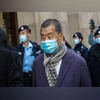Prominent activist and publisher Jimmy Lai on Tuesday pleaded not guilty to three charges of sedition and collusion with foreign countries in a landmark national security trial in Hong Kong.
Lai, a media tycoon who founded the now-defunct Apple Daily newspaper, faces one count of conspiring to print seditious publications to incite hatred against the Chinese and Hong Kong governments, as well as two counts of collusion with foreign countries to call for sanctions and other hostile actions against China and Hong Kong.
Flanked by three prison officers, Lai formally pleaded not guilty to the charges read to him, shortly after the court rejected a last-ditch attempt by his counsel to throw out a sedition charge against him. The court began hearing opening statements from the prosecution on Tuesday.
Dressed in a navy blazer and a white shirt, Lai smiled and waved at his family members as he entered the courtroom ahead of the start of the court session.
Lai, 76, was arrested during the city's crackdown on dissidents following huge pro-democracy protests in 2019.
He faces possible life imprisonment if convicted under a sweeping national security law imposed by Beijing. The trial is expected to last about 80 days without a jury.
More From This Section
His prosecution has drawn criticism from the United States and the United Kingdom. Beijing has called their comments irresponsible, saying they went against international law and the basic norms of international relations.
The case is being closely watched by foreign governments, business professionals and legal scholars. Many view it as a trial of the city's freedoms and a test for judicial independence in the Asian financial hub.
Hong Kong is a former British colony that returned to China's rule in 1997 under a promise the city retain its Western-style civil liberties for 50 years. That promise has become increasingly threadbare since the introduction of the security law, which has led to the arrests and silencing of many leading pro-democracy activists.
The governments of both Hong Kong and China have hailed the law for bringing back stability to the city.
Hong Kong, once seen as a bastion of media freedom in Asia, ranked 140th out of 180 countries and territories in Reporters Without Borders' latest World Press Freedom Index. The group said the city had seen an unprecedented setback since 2020, when the security law was imposed.
(Only the headline and picture of this report may have been reworked by the Business Standard staff; the rest of the content is auto-generated from a syndicated feed.)

)
